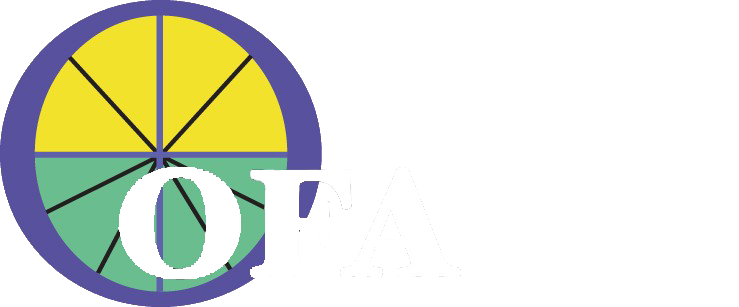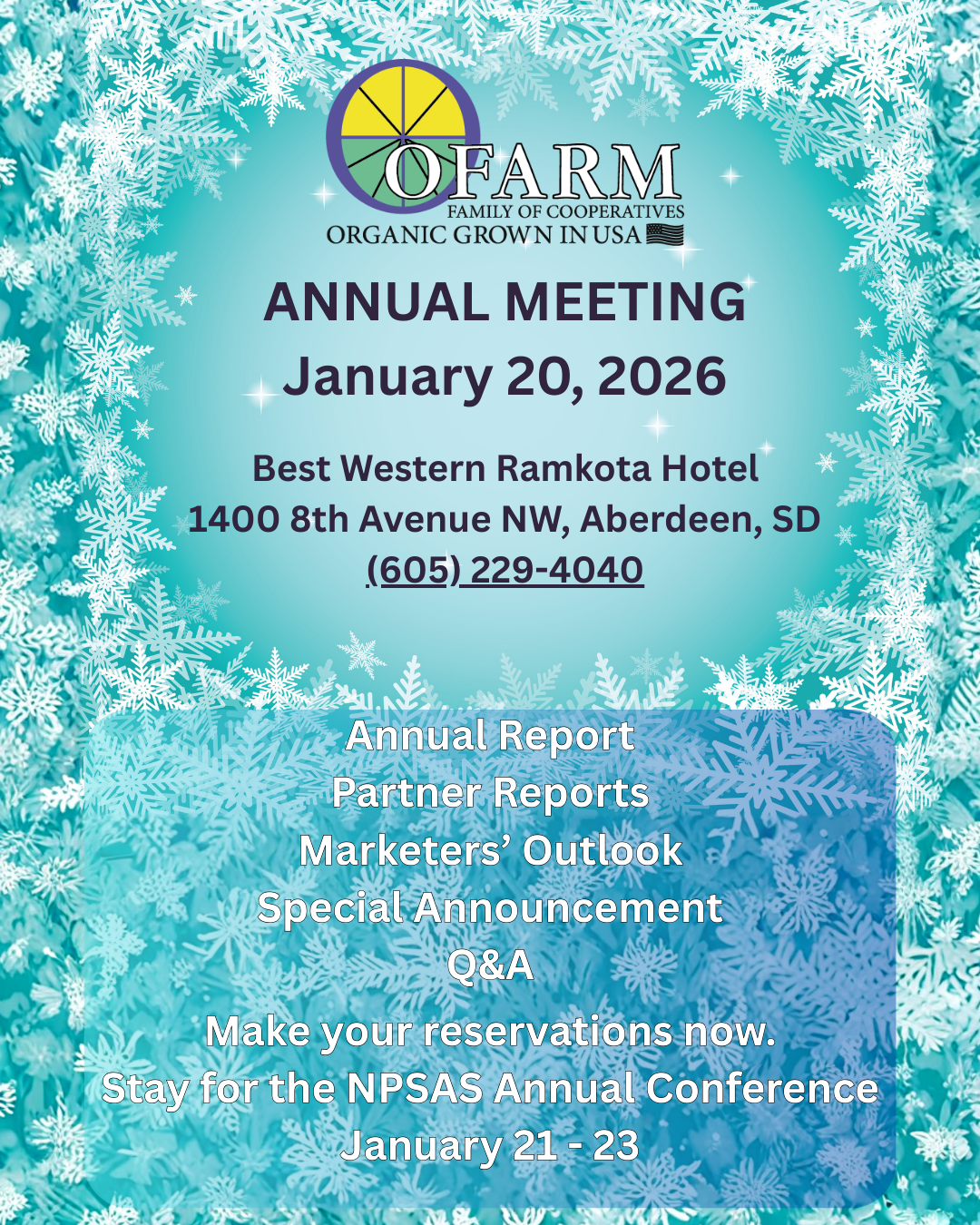This year we are teaming up with NPSAS Annual Conference. Meet us in Aberdeen SD on January 20, then stay for the NPSAS Annual Conference on January 21 - 23. Make hotel reservations NOW: Call 605-229-4040.
2025 ANNUAL MEMBER MEETING
2025 OFARM ANNUAL MEMBER MEETING IN LaCROSSE, WI
In conjunction with the Marbleseed Organic Farming Conference, OFARM will once again hold its Annual Member Meeting on February 19. Members are invited to attend starting at 8:00 at the Marriott Courtyard located at 500 Front Street South. The public is invited to attend starting at 9:30 am.
2025 FEBRUARY 20 WORKSHOP: THE FUTURE OF ORGANIC GRAIN MARKETING
The Future of Organic Grain Marketing:
How producers will shape organic grain production & marketing
WORKSHOP 1: Maneuvering Through the State of Organic Grain, Livestock Feed Demand & Marketing
WORKSHOP 2: Connecting Organic Grain Production Practices with a Successful Marketing Partnership
WORKSHOP 3: Cooperative Organic Grain Marketing: Myths & Realities
2024 REGIONAL MEETING HIGHLIGHTS
Day 1 did not disappoint at beautiful Freeman Prairie Arboretum. Superb service from their staff and a delicious home cooked lunched by Deb B. Marbleseed speakers Mercedes Talvitie and Tom Manley presented on Climate Smart Project and standards following by Nicole Tautges from Michael Fields Agricultural Institute who educated on carbon cycling from the how to, the why's and the benefits. Subsequently, OFARM member and organic farmer Will Ortman provided a tour of his family's egg farm, sharing stories and demonstrating their egg production process. The tour continued to his Climate Smart field, where he discussed his crop practices and rotations. The day concluded with a treat of Berry Brook's homemade ice cream. Will and his wife, Sheryl, craft their ice cream under the philosophy of "Small batch. Original recipes. Clean label," using eggs from their farm and fruit they've grown themselves. A heartfelt thank you to everyone who participated and contributed to the day's enjoyment and success.
Day 2 of OFARM's REGIONAL MEETING was a full day of education. People traveled up to 7 hours to attend!! We started with a panel discussion "What's the Story Behind Low Organic Prices". Attendees engaged with questions and conversations. We heard from organic grain buyer, Kay Heine, Carmen Fernholz, Tim Cada, Allison Walent, Roz Lehman, Kathleen Delate, Erin Healy, Lily Hawkins, and Abby Youngblood. The day ended with a social hour and a delicious organic chicken BBQ dinner.
Friday's meeting and field day was outstanding! Starting with lunch at the Whiskey Throttle Conference, Ethan Book from Iowa Organic Association started the meeting with an overview of CPS 823 and how local farmers can participate. Allison Walent from MW TOPP led discussions on mentor/mentee opportunities and benefits through the TOPP grant program. Carmen Fernholz from OFARM then led discussions on cooperative marketing. The group journeyed a whopping two miles to reach Travis Otto's family farm, where he mentees under his mentor, Paul Mugge. Travis demonstrated his resourcefulness and inventiveness with various tools and concepts that simplify his work. Subsequently, we embarked on a hayride for a field tour, which featured detailed descriptions of the research corn plots interspersed within his soybean fields.
Email MARKETING@OFARM.ORG if you wish to receive a recording of Thursday’s business meetings.
2024 Fall Regional Meeting Sept. 4, 5, 6 Freeman, SD; Sioux City, IA; Cherokee, IA
OFARM, CPOF, Iowa Organic Association and Midwest TOPP are co-hosting a Regional Meeting September 4, 5, 6.
Sept. 4: Climate Smart Commodities benefits, lunch & farm tour with Climate Smart practices being planned.
Sept. 5: “What’s the Story Behind Low Organic Grain Prices?”
State of Organics in Minnesota, State of Organics in Nebraska, CPS 823 benefits. Speakers from Scratch and Peck; USDA/NOP; Organic Farmers Association; National Organic Coalition; MW TOPP. Open discussion formulating strategies to cooperatively drive organic grain prices. Meet The Marketer and end the day with a delicious Organic BBQ dinner.
Sept. 6: Lunch, MW TOPP Mentorship Program, CPS 823 Overview, tour of Mentor farm. REGISTRATION CLOSED
Attendance is Free but MUST register to attend. To Register CLICK HERE. Questions? Email: Marketing@OFARM.org
MUST REGISTER TO ATTEND: CLICK HERE TO REGISTER.
2024 OFARM Annual Meeting
Below is the link to the recorded Annual Meeting held in LaCrosse, WI on February 22, 2024 https://us06web.zoom.us/j/88297631009?pwd=cQKPSDRZcBIRGnRRHCDvkPIMFpwnoQ.1
OFARM 2023 Fall Meeting
2023 Fall Meeting was held on September 7, 2023 in Milbank, South Dakota at The GrandStay Hotel & Suites. Guest speakers included Jennifer Tucker, Deputy Administrator USDA Agricultural Marketing Service, National Organic Program; Abby Youngblood, Executive Director National Organic Coalition; Lily Hawkins & Kate Mendenhall, Executive Director Organic Farmers Association; Krysti Mykkonen, Executive Director Northern Plains Sustainable Ag; Amalie Lipstreu, Policy Director Ohio Ecological Food and Farm Association; Lori Stern, Director Marbleseed.
Marbleseed Organic Farming Conference, February 23 - 25, 2023
Marbleseed Organic Farming Conference was held Thursday - Saturday, February 23 - 25, 2023 at the La Crosse Center, La Crosse, WI.
Organic University was on Thursday, February 23, 2023.
Developing a Marketable Rotation with Carmen Fernholz and Mike Schulist presenting all day on Thursday.
OFARM sponsored this conference.
Oren Holle, Steve Boyda, Paul Drake, and Tom Wanquist staffed the OFARM booth.
OFARM Annual Membership Meeting February 23, 2023
February 23, 2023 - OFARM Annual Membership Meeting was held at the Marriott, La Crosse, WI. From 11 AM - 1:30 PM Update from David Glasgow, Associate Deputy Administrator, USDA National Organic Program (NOP). From 2 PM - 5 PM Updates from several OFARM collaborators.
Ohio Ecological Food & Farming Association Conference
Friday, February 17th workshop title: Connecting Field Crop Production and Marketing. Presenters were Steve Boyda and Oren Holle from OFARM. Saturday, February 18th – Farmer panel on soil health for grain producers. This event was an opportunity for OFARM to get better acquainted with OEFFA members including the Organic Grain Growers Committee. Dave Shively is the Chair of the committee.












































